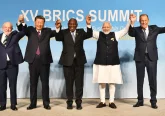 Social media has contributed to some of the largest political events of the last couple of years. It aided the Arab Spring, has been a constant thorn in the side of the Chinese authorities, has given Vladimir Putin and Mahmoud Ahmadinejad slight cause for concern, and it helped to organise the less-constructive London riots. The latest social media innovation is KONY 2012 by the advocacy group “Invisible Children.” The campaign, which went viral this week, is aimed at stopping Joseph Kony, the Ugandan-born leader of the Lord’s Resistance Army. The immediate relevance of this campaign has nothing to do with the issue itself, but with the response that it has received.
Social media has contributed to some of the largest political events of the last couple of years. It aided the Arab Spring, has been a constant thorn in the side of the Chinese authorities, has given Vladimir Putin and Mahmoud Ahmadinejad slight cause for concern, and it helped to organise the less-constructive London riots. The latest social media innovation is KONY 2012 by the advocacy group “Invisible Children.” The campaign, which went viral this week, is aimed at stopping Joseph Kony, the Ugandan-born leader of the Lord’s Resistance Army. The immediate relevance of this campaign has nothing to do with the issue itself, but with the response that it has received.
My own knee-jerk reaction when I noticed that a number of my friends on facebook were sharing this video, was ‘here we go again, another day of appeasing white guilt.’ As if having to read about the world’s problems isn’t enough, social media means that we constantly have to pat each other on the back and say ‘good for you, you care.’ While this appeasement has been present, it has been met by an equally strong army of sceptics, apparently tired of watching fad after fad unravel on the internet. The sceptic’s choice of weapon is the meme, as illustrated here, here, here, and then there’s all of these.
Admittedly, memes can be a hoot and probably have an effect equal to that of the actual KONY 2012 campaign. However, beyond the simple ‘denigration by meme’, the sceptic army has been reinforced by the heavy artillery of the informed blogger. These blogs and articles bring academic literature, factual data and intellectual opinion to the party. They typically start by agreeing that Joseph Kony is evil personified, before moving on to say why, in their opinion, Invisible Children is a dubious organisation that should not be trusted and has quite simply got their tactics wrong. The most common response thus far has been to, correctly, point out that the issue is far more complicated than Invisible Children makes out. Foreign Affairs wrote an interesting article on Barack Obama and Joseph Kony last year that better encapsulates the problem. Some of the more activist-prone KONY sceptics have argued that perhaps all of this effort should be put into stopping Uganda’s anti-gay bill.
The rise in scepticism appears to be part of a growing trend of what The Economist refers to, rather eloquently, as Armageddon fatigue. Social media has done many good things, but it has also served to inundate the younger generation with bad news. If it’s not the crumbling European economy and impending global slump, it’s the Rhinos, the whales and the dolphins that we should be thinking of. A quick flick through my email’s spam folder reveals countless calls to stop the genocide in Sudan. Facebook and twitter users are faced with a constant barrage of graphic pictures and misinformation. On every cause, the proponents and sceptics are probably the same people, who are more engaged with each other, it would seem, than they are with the substance of the issues.
Given the ongoing conflict between the bleeding hearts and the fatigued sceptics, it is not yet clear what the overall impact of social media on substantive issues will be. Especially when it comes to mobilising global support for worthwhile causes.
Seamus Duggan is an MPhil student at Oxford.







1 Comment
The author completely misses the point. The issue here is that the government, the academic world and the media have become as inbred as hillbillies. The press is dead. The universities that once were a wellspring of original thought, reasoned dissent and analysis have completely lost the recipe. The government now acts as an extension of their corporate masters with what now passes for intellectuals acting as cheerleaders. The circular flow of money between them and the musical chairs among them insures a narrow and predicable agenda nearly completely immune to popular opinion and even basic common sense.
This is nowhere more manifest than the current march toward conflict with Iran, a country who less than 20% of the people could find on a map if you removed the names.
This effort, on the other hand, is a demand by the people, the real financiers of the entire system, to actually get some good out of the trillions they’ve collectively invested in their military to bring a real bad guy to justice. Astounding considering that nothing even remotely like this is going on at a grassroots level for any of the wars being promoted and “debated” by either the government or academics. Rather, a nation of sheep has accepted that they will be taxed to death to support a military that increasingly acts as the private army for fat-cats and who’s efforts seem to be increasingly turned on the people themselves.
Yet, the author sees only the surface and is content to look down his nose at the effort, take a long draw on his pipe and wonder aloud about the psychology of social media with his dull cronies at the university club.